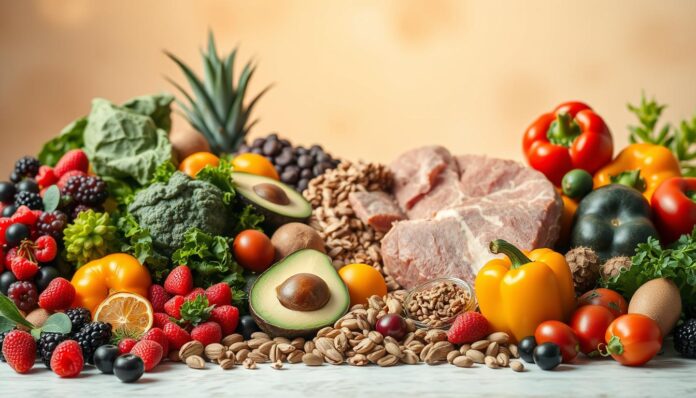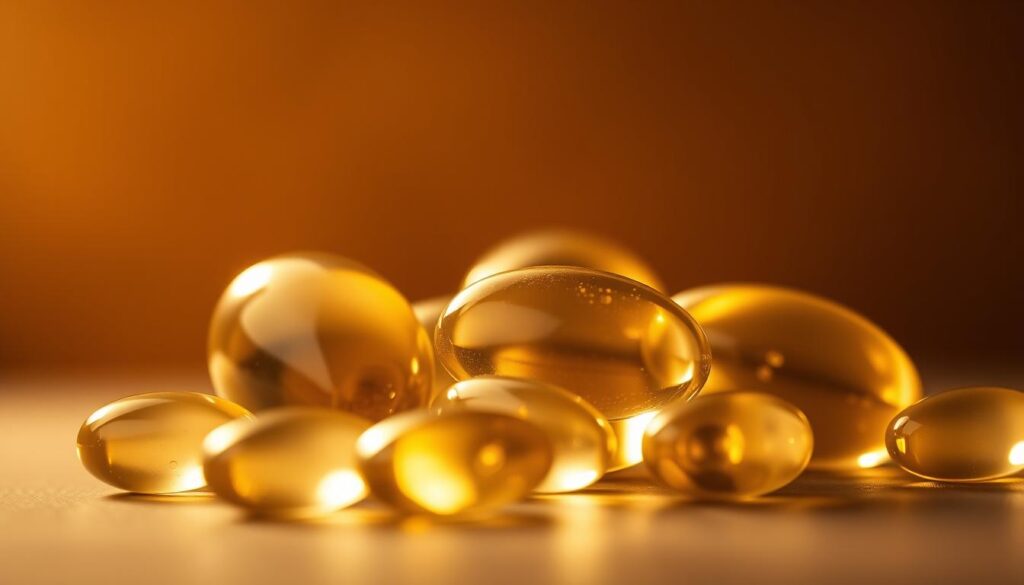Imagine waking up and seeing your skin glow in the mirror. It’s not just from expensive creams. It comes from what you eat. Your skin is the biggest organ, and food is key to its health.
While genes and the environment matter, your diet has a big impact. This guide shows how food can make your skin better. It talks about nutrients that improve skin elasticity and hydration.
By changing what you eat, you can get the clear, glowing skin you want.
Key Takeaways
- A balanced diet including at least five servings of fruits and vegetables daily is vital for skin health.
- Vitamin C, important for collagen, is found in fruits like strawberries and oranges.
- Drinking six to eight glasses of water a day keeps your skin moist.
- Healthy fats and antioxidants in your diet fight aging and improve skin elasticity.
- Stay away from refined carbs and crash diets to keep your skin firm and prevent damage.
Understanding the Basics of a Balanced Diet
Creating a healthy diet is key for skin health. It’s important to eat a variety of foods. This includes colorful fruits and vegetables, which are full of vitamins and antioxidants.
Healthy fats, whole grains, and lean proteins also support your skin. They help keep your skin looking vibrant and healthy.
Key Nutrients for Skin Health
Vitamins A, C, E, and minerals like zinc and selenium are important for skin health. Vitamin A, found in carrots and leafy greens, helps repair skin. Vitamin C, in citrus fruits and berries, keeps skin elastic.
Proteins from lean meats, fish, and dairy are essential for skin health. Whole grains, rich in fiber, help your body absorb nutrients better. This ensures your skin gets the nourishment it needs.
Importance of Hydration
Drinking enough water is vital for skin health. Dehydration can make your skin look dull. Aim for 6-8 glasses of water a day.
Water-rich foods like cucumbers, melons, and oranges also help. Eating at least five portions of fruits and vegetables daily is beneficial. For more tips on healthy eating, check out this guide.
Foods That Promote Healthy Skin
Eating for healthy skin means adding fresh fruits, veggies, grains, and healthy fats to your diet. These foods give your skin the nutrients it needs to repair, stay hydrated, and be healthy. Knowing which foods to eat can help you get a glowing skin.
Fruits and Vegetables to Include
Fresh fruits and veggies are full of vitamins, minerals, and antioxidants. These are great for your skin. Here are some key ones:
- Berries: They’re packed with vitamin C and antioxidants. These help your skin stay elastic and repair itself.
- Carrots: They’re rich in beta-carotene, which fights sun damage and helps your skin heal.
- Kiwis: Kiwis have more vitamin C than oranges. This vitamin keeps your skin hydrated and strong.
- Dark leafy greens: Spinach and kale are full of antioxidants. Eating them regularly can lower your risk of skin cancer.
Whole Grains and Their Benefits
Whole grains are essential for your skin. They give you fiber and nutrients that help control blood sugar and keep your skin healthy. Try adding these to your diet:
- Barley: It’s good for your skin and has a low glycemic index. This can help with acne.
- Quinoa: It’s a complete protein and has vitamins and minerals. These support your skin’s repair.
Healthy Fats for Skin Nourishment
Healthy fats are key for keeping your skin moist and fighting inflammation. Make sure to include these in your diet:
- Oily fish: Salmon and sardines have omega-3 fatty acids. These reduce inflammation and protect your skin from UV damage.
- Avocados: They’re full of healthy fats. These fats help keep your skin hydrated and elastic.
- Nuts and seeds: Almonds, walnuts, and flaxseeds have vitamin E and essential fatty acids. These protect your skin from aging.
Antioxidants and Their Role
Eating foods rich in antioxidants is key for healthy skin. Antioxidants fight off free radicals, which harm skin cells and speed up aging. Eating these foods helps protect your skin from damage and keeps it healthy.
Top Antioxidant-Rich Foods
- Blueberries: These small berries are full of antioxidants, fighting oxidative stress.
- Dark Chocolate: Choose chocolate with lots of cocoa for flavonoids that protect and moisturize the skin.
- Green Tea: It’s full of polyphenols that protect against UV damage and reduce inflammation.
- Pomegranates: Rich in vitamin C and antioxidants, they make skin more resilient.
- Kale and Broccoli: These veggies are packed with vitamins and minerals for healthy skin and a balanced diet.
- Walnuts and Pecans: Nuts are good for healthy fats and selenium, helping new cells and healing.
- Carrots: They’re full of beta-carotene, keeping skin hydrated and healthy.
- Artichokes: A source of flavonoids and phenolic acids, they manage free radicals and support skin health.
How Antioxidants Combat Skin Aging
Antioxidants help fight skin aging in many ways. They protect skin cells from UV damage, reducing wrinkles and pigmentation. Vitamin C, found in the skin, boosts collagen and firms the skin. Selenium and vitamin E also help prevent wrinkles and skin cancer.
Eating antioxidant-rich foods regularly, along with a good diet and skin wellness plan, improves skin hydration and reduces inflammation. This makes the skin softer and more even in texture. Make sure to eat whole grains, nuts, and colorful fruits and veggies to get these important nutrients every day.
The Impact of Sugar on Your Skin
Controlling your sugar intake is key for healthy skin. Over the last 50 years, sugar use has skyrocketed. This has led to concerns about its impact on health, including skin issues. A diet high in sugar can cause inflammation, speed up aging, and worsen acne.
By knowing how sugar affects your skin, you can choose better foods. This helps keep your skin healthy and glowing.
How Sugar Affects Skin Health
Too much sugar raises blood sugar levels, making you look older. Research shows that those who eat more sugar age faster. High sugar intake also increases oil, clogging pores and causing acne.
Stress can make these problems worse, damaging skin through glycation. This process harms collagen and elastin, causing wrinkles and sagging.
Stopping refined sugars can improve your skin. It can lead to better hydration, fewer breakouts, and smoother skin. High sugar diets can also upset hormones, causing eczema and psoriasis to flare up.
Recent studies show a strong link between sugar and acne. This highlights the importance of a careful diet.
Alternatives to Refined Sugar
Switching to natural sweeteners can greatly benefit your skin. Honey or stevia are good alternatives that don’t harm your skin like refined sugar does. Limiting added sugars to 10% of your daily calories helps your skin stay healthy.
Drink more water to stay hydrated. Aim for eight glasses a day. A diet full of antioxidants and omega-3s also helps fight sugar’s damage. Making these changes can make your skin look better and brighter.
Vitamins and Minerals Essential for Skin
Keeping your skin healthy needs the right vitamins and minerals. These nutrients help your skin grow, stay elastic, and feel good. Eating foods rich in these nutrients can make your skin glow.
Vitamin A and Its Sources
Vitamin A is key for skin health. It fights sun damage and keeps oil glands working right. You can get it from:
- Carrots
- Sweet potatoes
- Leafy greens like kale and spinach
Eating enough vitamin A can make your skin look and feel better.
Vitamin C for Collagen Production
Vitamin C is important for making collagen. This keeps your skin elastic. Not enough vitamin C can cause easy bruising and bleeding gums. To get more vitamin C, try:
- Citrus fruits like oranges and grapefruits
- Bell peppers
- Strawberries
These foods also protect against sun damage and help wounds heal.
Zinc and Its Benefits for Skin Healing
Zinc is found in the skin’s outer layer. It helps with healing and reduces inflammation. Without enough zinc, you might get skin problems that don’t get better with moisturizers. Foods high in zinc include:
- Nuts
- Shelled fish like oysters and shrimp
- Legumes, like lentils and chickpeas
The Role of Omega-3 Fatty Acids
Omega-3 fatty acids are key for skin health. Our bodies can’t make them, so we must get them from food. Foods high in omega-3s give healthy fats for skin nourishment and many other health benefits.
Sources of Omega-3 for Your Diet
There are two main types of omega-3 sources: marine and plant-based. Fatty fish like salmon, mackerel, and sardines are full of EPA and DHA. For plant-based options, flaxseeds, chia seeds, and walnuts have ALA. The recommended daily intake is about 1.6 grams for males and 1.1 grams for females.
How Omega-3s Benefit Skin Health
Omega-3s have strong anti-inflammatory effects. They help with skin issues like eczema and psoriasis. They keep skin hydrated, reduce inflammation, and make the skin barrier stronger. This makes omega-3s vital for a diet that boosts skin health.
Adding omega-3 sources to your meals is a tasty way to improve skin health. Whether it’s fish or plant-based options, getting enough omega-3s is key for your skin’s health.
Culinary Herbs and Spices for Skin
Culinary herbs and spices do more than add flavor to your food. They also offer herbs for skin health benefits that can improve your skin and overall health. Turmeric, ginger, and rosemary are great examples. They are full of antioxidants and can reduce inflammation. Adding them to your meals can make your skin healthier and your food more tasty.
Best Herbs for Skin Nourishment
Some herbs are better than others for your skin. Here are a few you should try:
- Turmeric: This bright yellow spice is packed with curcumin. It fights inflammation and helps your skin look even.
- Ginger: This root is a powerhouse against oxidative stress. It also boosts blood flow, which is good for your skin.
- Rosemary: Full of antioxidants, rosemary protects your skin from damage. It also makes your skin feel smoother.
- Cinnamon: This spice lowers blood sugar and has anti-inflammatory effects. It helps your skin stay clear.
- Garlic: Garlic has allicin, which fights acne and makes your skin glow.
How to Incorporate Spices in Your Meals
Adding culinary spices to your meals is easy and good for you. Here are some ways to do it:
- Season vegetables: Sprinkle turmeric or rosemary on veggies for extra flavor and health benefits.
- Mix into marinades: Add ginger or garlic to marinades for meats or tofu. It makes them taste better and is good for your skin.
- Stir into soups and stews: Spices like cinnamon and turmeric make your dishes more nutritious and warm.
- Brew herbal teas: Drinking ginger or rosemary tea is a fun way to get these herbs into your diet.
The Importance of Probiotics
Probiotics are key for keeping your gut and skin healthy. They help balance the good bacteria in your gut. This balance is important for your skin to look its best.
Foods Rich in Probiotics
To get the most from probiotics, eat foods that are full of them. Some great examples are:
| Food | Probiotic Strain | Health Benefit |
|---|---|---|
| Yogurt | Lactobacillus acidophilus | Improves gut health |
| Kefir | Lactobacillus kefiri | Enhances digestion |
| Kraut | Lactobacillus plantarum | Reduces inflammation |
| Kimchi | Leuconostoc mesenteroides | Boosts immune function |
| Kombucha | Bacillus coagulans | Aids detoxification |
When picking probiotic foods, look for “live and active cultures” on the label. This ensures they’re effective. Eating these foods regularly helps your skin and gut stay healthy.
How Probiotics Support Healthy Skin
A healthy gut means clearer skin. Probiotics help your skin stay moist and improve its barrier. They also:
- Reduce the risk of skin problems like acne and eczema.
- Keep your skin hydrated by making more ceramides.
- Keep your skin’s pH balanced, which helps with dryness and irritation.
Understanding the connection between your gut and skin can help you improve both. Adding probiotic foods to your diet and looking into personalized nutrition can lead to better skin.
Hydration: The Key to Glowing Skin
Hydration is key for healthy skin. It keeps your skin elastic and prevents many skin problems. Drinking enough water is important for glowing skin. Experts say you should drink 8 to 10 glasses a day.
Some foods also help with hydration. These foods can increase your water intake and improve your skin.
How Much Water Do You Really Need?
Knowing how much water you need is the first step to glowing skin. Try to drink at least six to eight glasses a day. Drinking enough water helps avoid dry, flaky, red, and irritated skin.
Studies show that more water can make your skin more elastic and smooth out fine lines. Drinking two cups of water can also improve blood flow. This helps your skin look more even.
Hydrating Foods to Consider
Eating hydrating foods is important for your skin’s health. Here are some foods to add to your diet:
- Cucumbers – They have a lot of water, helping with hydration.
- Watermelon – It’s not only hydrating but also refreshing and full of vitamins.
- Oranges – They’re rich in Vitamin C, which is good for collagen.
- Green leafy vegetables – They provide hydration and important nutrients.
- Berries – They’re full of antioxidants and help with hydration.
Eating a balanced diet with these foods can fight off free radicals. This helps keep your skin looking young. Remember, your skin is the second-largest organ in your body. Keeping it hydrated is key to your overall health.
Crafting Your Balanced Diet for Skin Health
To support your skin’s health, it’s key to make meal plans that include many nutrients. Foods that hydrate, have healthy fats, antioxidants, vitamins, and proteins are great. They make your skin look better and keep you healthy overall. Eat lots of colorful fruits and veggies, lean proteins, and whole grains to keep your meals balanced.
Sample Meal Plans for Glowing Skin
Start your day with Greek yogurt, berries, and nuts for breakfast. This mix gives you protein and antioxidants. For lunch, try a salad with dark greens, avocado, and salmon. It’s packed with omega-3s and vitamins A and E.
At dinner, make a stir-fry with colorful veggies and lean chicken. This way, you get enough protein and antioxidants. Adding these habits to your daily life can greatly improve your skin’s health.
Tips for Maintaining a Balanced Diet
Meal planning is a big help. Try meal prepping to have healthy food ready. Also, check food labels to avoid processed foods. Drink at least 8 glasses of water a day to keep your skin moist.
For tips on healthy shopping and cooking, check out this guide. By following these tips, you can make a diet that boosts your skin’s health and energy.
FAQ
What is the best diet for healthy skin?
A balanced diet for healthy skin includes colorful fruits and veggies, whole grains, and healthy fats. It also has lean proteins. Vitamins A, C, E, zinc, and omega-3 fatty acids are key for skin health.
How does hydration affect my skin?
Hydration keeps your skin elastic and removes toxins. Drinking 6-8 glasses of water daily is important. Eating hydrating foods like cucumbers and oranges also boosts your skin’s glow.
Which foods are high in antioxidants for skin health?
Blueberries, dark chocolate, green tea, and dark leafy greens are great for skin. They fight free radicals and reduce aging signs.
Can sugar consumption negatively impact my skin?
Yes, too much sugar can cause inflammation and worsen acne. Cutting down on refined sugar and using natural sweeteners can help your skin look clearer.
What role do omega-3 fatty acids play in skin health?
Omega-3 fatty acids reduce inflammation and improve skin hydration. Foods like fatty fish, flaxseeds, and walnuts are good sources.
Why are probiotics important for my skin?
Probiotics improve gut health, which benefits your skin. Foods like yogurt, kefir, and fermented veggies reduce inflammation and lead to clearer skin.
How much water should I drink for optimal skin health?
Drink 6-8 glasses of water daily for skin hydration. Hydrating foods also contribute to your fluid intake.
What are some beneficial culinary herbs and spices for skin?
Turmeric, ginger, and rosemary add flavor and offer antioxidants and anti-inflammatory benefits. They support skin health.
What vitamins are essential for maintaining skin health?
Vitamins A, C, and E are key for skin health. Vitamin A regenerates cells, vitamin C boosts collagen, and vitamin E protects against oxidative stress.
How can I create a meal plan for better skin health?
To create a skin-friendly diet, eat colorful fruits and veggies, whole grains, healthy fats, and quality proteins. Meal prep and avoid processed foods to keep your diet balanced.






